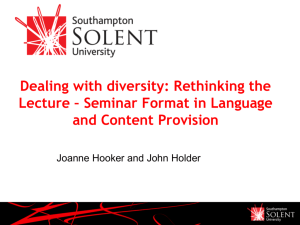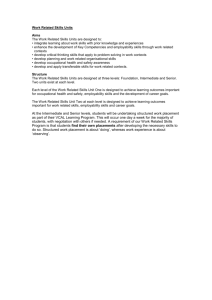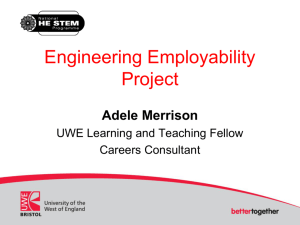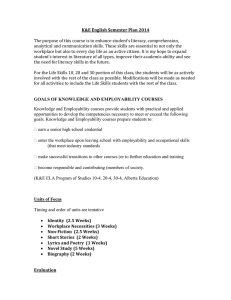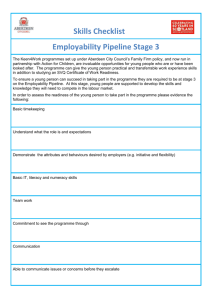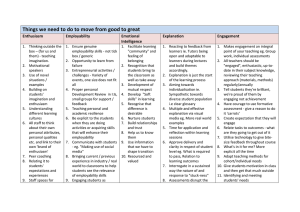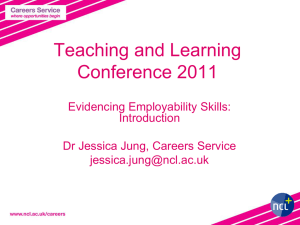Document 12063853
advertisement
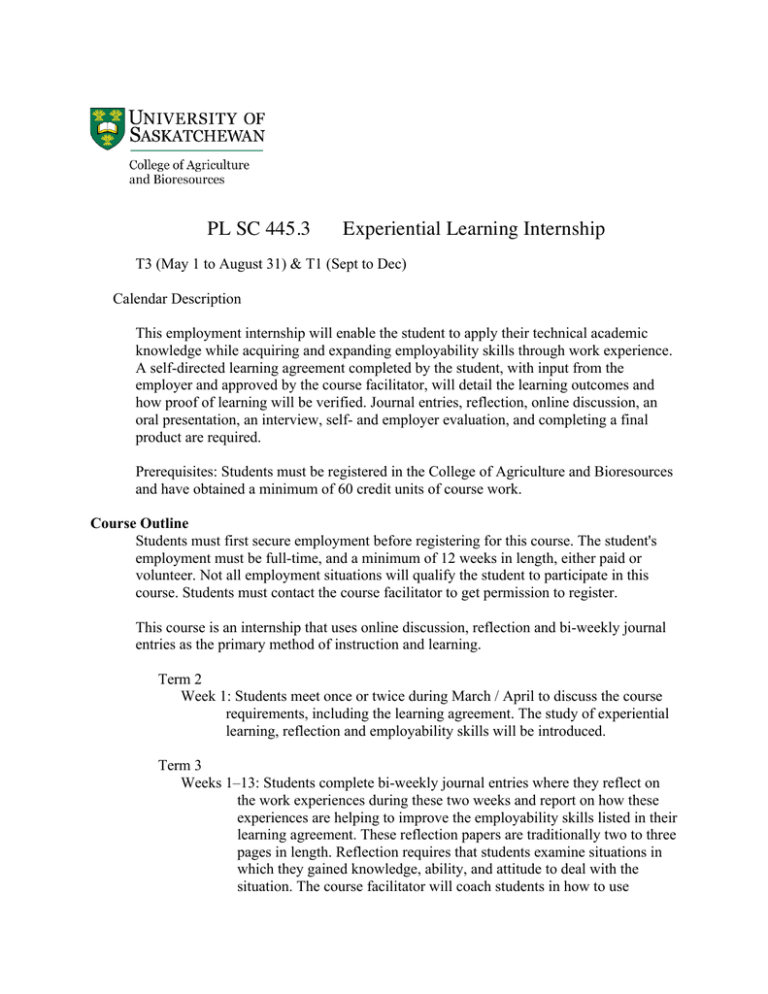
PL SC 445.3 Experiential Learning Internship T3 (May 1 to August 31) & T1 (Sept to Dec) Calendar Description This employment internship will enable the student to apply their technical academic knowledge while acquiring and expanding employability skills through work experience. A self-directed learning agreement completed by the student, with input from the employer and approved by the course facilitator, will detail the learning outcomes and how proof of learning will be verified. Journal entries, reflection, online discussion, an oral presentation, an interview, self- and employer evaluation, and completing a final product are required. Prerequisites: Students must be registered in the College of Agriculture and Bioresources and have obtained a minimum of 60 credit units of course work. Course Outline Students must first secure employment before registering for this course. The student's employment must be full-time, and a minimum of 12 weeks in length, either paid or volunteer. Not all employment situations will qualify the student to participate in this course. Students must contact the course facilitator to get permission to register. This course is an internship that uses online discussion, reflection and bi-weekly journal entries as the primary method of instruction and learning. Term 2 Week 1: Students meet once or twice during March / April to discuss the course requirements, including the learning agreement. The study of experiential learning, reflection and employability skills will be introduced. Term 3 Weeks 1–13: Students complete bi-weekly journal entries where they reflect on the work experiences during these two weeks and report on how these experiences are helping to improve the employability skills listed in their learning agreement. These reflection papers are traditionally two to three pages in length. Reflection requires that students examine situations in which they gained knowledge, ability, and attitude to deal with the situation. The course facilitator will coach students in how to use 2 reflection as a learning tool. Some examples include reflecting on the experience of handling customer complaints, working with supervisors who have different management styles, communicating effectively with customers/co-workers, working with people from another culture and understanding how that impacts their actions and decision making, taking responsibility for errors made, or receiving praise for a job well done. The course facilitator will engage students in on-going online discussions regarding their journal entries. This discussion helps students understand how to apply their learning to other situations. Students, employer and the facilitator will work together to choose a topic for their final product. Term 1 Week 1-: Students will meet as a group to discuss their experiences during their internship. Students choose dates for their employment interview, and discuss the remaining course requirements. Weeks 2–7: Students work towards completing the final product, plus prepare for their interview. Final product is due in late September. Interviews are to be completed by mid October. Students will complete their selfevaluation. Employers will be sent the employer evaluation. Course Learning Outcomes: The overall goal of the course is to instill a positive attitude and to increase the knowledge and skills of students. Upon completion of this course the student will have: 1. enhanced employability through their expanded knowledge of employability skills; 2. greater self confidence through actual work experience and knowing their employability strengths; 3. more fully developed workplace management skills, thus better preparing them for future employment, and; 4. increased ability to use reflection as a learning tool which in turn allows them to apply what they learned to new contexts or situations In an increasingly competitive, diversified, and global workplace, companies and organizations must strive to optimize their efficiency and effectiveness. Training new staff is resource-intensive therefore employers seek employees who have both academic knowledge and employability skills and who are able to instantly become productive employees. This course requires that students obtain and expand their employability skills in a real-life environment. Employability skills also referred to as transferable skills, soft skills, human resource skills, or workplace skills include such things such as communication, analytical, interpersonal, leadership, organizational, problem-solving, and teamwork skills. Regardless of the job, employability skills are basic, universal, and transferable from job to job and are highly advantageous in society. 3 Course Assessment Student grading will follow the “grades and literal description at the U of S” document (http://www.usask.ca/sesd/colleges/faculty/enrolment/). 30% final product – this will be a product that will be of benefit to the employing organization and which shows the student gained employability skills during their employment. • Example: the student may be assigned the task of helping develop a field day, even though they have no experience. The final product could be the development of a manual outlining how to develop a field day and will contain the experience of the students, and possibly the experience of other colleagues. This will be of benefit to future students in the same role. • Example: the student may be assigned the task of responding to farmer complaints even though they have no experience in this area. The final product could be the development of a process outlining how to approach producers, calm them, discuss and resolve the complaint. This process will be beneficial to future students in the same role. • The student will discuss the final product with their supervisor, as it is anticipated that the supervisor will actually use the final product. The development of the product is entirely the responsibility of the student. The final product cannot be part of assigned work duties. 30% journal - students are required to submit bi-weekly reflection papers / journal entries, reflecting on / highlighting the work experiences they had and how these experiences lead to the growth of employability skills. The learning agreement is a living document and is expected to grow during the course of employment. The student may not be familiar with all the potential employability skills at the start of this course, but as they encounter experiences they can add more learning outcomes to the learning agreement. Journal entries are traditionally two to three pages in length and require the student to reflect on situations they were in and how these situations developed their employability skills. The journal is not a time sheet – chronological. Students are required to read the handout on reflective journaling which has an example of a journal entry, and is also posted on the website. 20% job interview – job interviews can be very stressful, but they are also an excellent opportunity for students to reflect on their work / social experiences and promote strong employability skills. Using behvioural-based questions, students will prepare for and participate in a job interview. Feedback will be supplied at the end of the interview. 10% experiential learning assessment - the employer participated in the development of the student’s learning agreement, and therefore was familiar with the skills the students wished to develop during their summer employment. The employer worked closely with the student, and was charged with sharing their employability skills with the student. The employer is most capable of determining if the student had a positive attitude towards learning, concentrated on achieving the goals in the learning agreement, and observing the amount of effort the student devoted to the course. 10% self-assessment - as an adult learner, the student is required to critically assess themselves as a student and indicate their commitment to the course through showing 4 a positive attitude towards learning, achieving the goals in their learning agreement, and fulfilling the course requirements. Effort separates a 60% student from a 90% student. Higher grades will be assigned to students who take seriously the desire to learn from experience and to apply that learning to new experiences. This can be seen in the bi-weekly journal entries. The course facilitator will coach students in how to use reflection as a learning tool. Those students who put major effort into the development of their journal entries, final product, and interview will receive higher marks. This course requires no rote memorization. It requires the gaining of knowledge, attitude and skills through experience coupled with reflecting on the experience. It is unlike other courses offered in the college.
